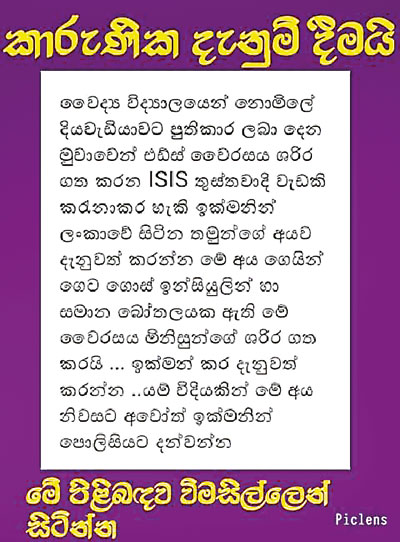News
Anti-Filariasis campaign suffers as ISIS rumour swells on social media

One of the canard posts on social media
The Criminal Investigation Department (CID) is yet to make any arrests regarding a complaint lodged by the Health Ministry over a recent social media canard which linked a health ministry blood test campaign to the global terrorist group ISIS.
The widely shared social media posts have severely inconvenienced Health Ministry officials engaged in a campaign to eradicate elephantiasis, medically known as Lymphatic Filariasis (LF).
The Health Ministry’s Anti Filariasis Campaign (AFC) aims to eradicate LF from the country by 2020. According to the Health Ministry, LF is endemic in eight districts — Colombo, Kalutara, Gampaha, Galle, Matara, Hambantota, Kurunegala and Puttalam. As part of the measures to combat the disease, Public Health Field Officers (PHFOs) visit homes at night to obtain blood samples from people to test whether the parasite which causes LF is present in their blood streams.
The campaign has now been severely impeded due to the wide circulation of the social media posts which claimed that people linked to the ISIS terrorists would come in the guise of health officials to inject them with the HIV virus, while taking their blood samples. Some posts claimed that the visitors would inject the HIV virus, saying they were only injecting insulin.
The posts in Sinhala and English started circulating from the beginning of this month. They carried the label “Urgent.” Though there were several versions of these posts, which mostly appeared on Facebook, the message was the same. They urged the public to immediately call the police to hand over those who come to their houses in the night to conduct blood tests.
One particular post seen by the Sunday Times had been shared more than 102,000 times since it first appeared on May 4. Another, which appeared on the same day, had been shared among 60,000 Facebook users.
Only a handful of users had questioned the authenticity of the posts. The overwhelming majority had chosen to simply share them without question.
Health Ministry Director Dr. Devika Mendis, who is in charge of the Anti Filariasis Campaign, said health officials took the blood samples in the night because it was the time that the parasitic worms which caused LF were active.
“Even then, we only take two drops of blood onto a slide and the needles used in the process are new and taken out in the presence of the inmates of the house,” she said. “If tests on the blood samples reveal the presence of the parasite, the PHFOs then visit the households and even provide the pills needed to treat them free of charge.”
The officers who visit homes are in uniform and carry the Ministry identity cards.
The panic created by the social media posts has prompted people to view the PHFOs with suspicion and in some cases outright hostility, though they were in uniform and carried the Ministry identity cards, Dr Mendis lamented.
“We have had our officers surrounded and aggressively questioned by residents, while some people have called the police,” she said. “Most officers visit homes alone and when they get a hostile response, it naturally makes them reluctant to carry out their duties and fear for their own safety,” Dr. Mendis said.
Some people have complained that they have been given no prior warning by authorities that PHFOs would show up at their door at night for blood tests.
Dr. Mendis agreed that in general no prior announcement was made, though officers sometimes visited the homes during the day to tell the households that they wouldbe visiting in the night. But, some houses were closed during the day.
She urged people to support the programme conducted free of charge and not to believe the rumour.
Although, the Health Ministry has taken prompt action to rubbish the rumour and inform the people about the authenticity of the campaign, the suspicion has not completely gone away.
Adding to the rumour was an alleged incident where an unidentified person escaped after obtaining a blood sample from a 11-year-old boy at a school in Kinniya. The incident received wide media coverage. Police investigations into this incident are ongoing.
Given the panic created by the rumours and the alleged incident in Kinniya, PHFOs have also now been instructed to provide written notice to the area Medical Officer of Health prior to conducting house-to-house visits so as to prevent misunderstandings.
Meanwhile, Senior Information Security Engineer Roshan Chandraguptha urged social media users to verify the credibility of the posts before they shared them with their friends or followers.
“When someone shares something on social media without verifying the information first, and if that information is then blindly shared by others, it creates a snowball effect where false information is shared widely,” the expert, who is attached to the Sri Lanka Computer Emergency Readiness Team (SLCERT), told the Sunday Times.
Mr. Chandraguptha said there were two sides to every story and it was up to the police to get to the bottom of the matter.
He said, theoretically, the CID did have capability to track down those who had originated the rumours, but the process would be difficult, because Facebook was governed primarily by US laws.

